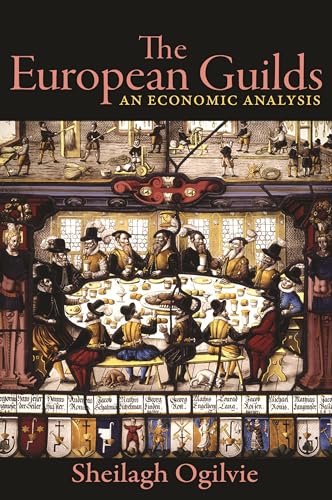9780691137544 - The European Guilds: An Economic Analysis: 78 (The Princeton Economic History of the Western World) von Ogilvie, Sheilagh (6 Ergebnisse)
Suchfilter
Produktart
- Alle Product Types
- Bücher (6)
- Magazine & Zeitschriften (Keine weiteren Ergebnisse entsprechen dieser Verfeinerung)
- Comics (Keine weiteren Ergebnisse entsprechen dieser Verfeinerung)
- Noten (Keine weiteren Ergebnisse entsprechen dieser Verfeinerung)
- Kunst, Grafik & Poster (Keine weiteren Ergebnisse entsprechen dieser Verfeinerung)
- Fotografien (Keine weiteren Ergebnisse entsprechen dieser Verfeinerung)
- Karten (Keine weiteren Ergebnisse entsprechen dieser Verfeinerung)
- Manuskripte & Papierantiquitäten (Keine weiteren Ergebnisse entsprechen dieser Verfeinerung)
Zustand Mehr dazu
- Neu (6)
- Wie Neu, Sehr Gut oder Gut Bis Sehr Gut (Keine weiteren Ergebnisse entsprechen dieser Verfeinerung)
- Gut oder Befriedigend (Keine weiteren Ergebnisse entsprechen dieser Verfeinerung)
- Ausreichend oder Schlecht (Keine weiteren Ergebnisse entsprechen dieser Verfeinerung)
- Wie beschrieben (Keine weiteren Ergebnisse entsprechen dieser Verfeinerung)
Einband
- alle Einbände
- Hardcover (6)
- Softcover (Keine weiteren Ergebnisse entsprechen dieser Verfeinerung)
Weitere Eigenschaften
- Erstausgabe (Keine weiteren Ergebnisse entsprechen dieser Verfeinerung)
- Signiert (Keine weiteren Ergebnisse entsprechen dieser Verfeinerung)
- Schutzumschlag (Keine weiteren Ergebnisse entsprechen dieser Verfeinerung)
- Angebotsfoto (2)
Sprache (1)
Preis
- Beliebiger Preis
- Weniger als EUR 20 (Keine weiteren Ergebnisse entsprechen dieser Verfeinerung)
- EUR 20 bis EUR 45 (Keine weiteren Ergebnisse entsprechen dieser Verfeinerung)
- Mehr als EUR 45
Gratisversand
Land des Verkäufers
Verkäuferbewertung
-
The European Guilds - An Economic Analysis
Verlag: Princeton University Press, 2019
ISBN 10: 0691137544 ISBN 13: 9780691137544
Sprache: Englisch
Anbieter: PBShop.store US, Wood Dale, IL, USA
HRD. Zustand: New. New Book. Shipped from UK. Established seller since 2000.
-
The European Guilds
Verlag: Princeton University Press, 2019
ISBN 10: 0691137544 ISBN 13: 9780691137544
Sprache: Englisch
Anbieter: PBShop.store UK, Fairford, GLOS, Vereinigtes Königreich
EUR 50,83
EUR 7,67 für den Versand von Vereinigtes Königreich nach USAAnzahl: 2 verfügbar
In den WarenkorbHRD. Zustand: New. New Book. Shipped from UK. Established seller since 2000.
-
The European Guilds: An Economic Analysis
Verlag: Princeton University Press, 2019
ISBN 10: 0691137544 ISBN 13: 9780691137544
Sprache: Englisch
Anbieter: Kennys Bookstore, Olney, MD, USA
Zustand: New. 2019. Hardcover. . . . . . Books ship from the US and Ireland.
-
European Guilds
Verlag: Princeton University Press, 2019
ISBN 10: 0691137544 ISBN 13: 9780691137544
Sprache: Englisch
Anbieter: moluna, Greven, Deutschland
Zustand: New. Über den AutorrnrnSheilagh Ogilvie is professor of economic history at the University of Cambridge and a fellow of the British Academy. Her books include Institutions and European Trade and A Bitter Living.Klappentextrnr.
-
The European Guilds An Economic Analysis
Anbieter: Revaluation Books, Exeter, Vereinigtes Königreich
EUR 95,21
EUR 17,01 für den Versand von Vereinigtes Königreich nach USAAnzahl: 2 verfügbar
In den WarenkorbHardcover. Zustand: Brand New. 272 pages. 9.50x6.25x1.50 inches. In Stock.
-
The European Guilds - An Economic Analysis
Verlag: Princeton University Press Sep 2019, 2019
ISBN 10: 0691137544 ISBN 13: 9780691137544
Sprache: Englisch
Anbieter: AHA-BUCH GmbH, Einbeck, Deutschland
Buch. Zustand: Neu. Neuware - Guilds ruled many crafts and trades from the Middle Ages to the Industrial Revolution, and have always attracted debate and controversy. They were sometimes viewed as efficient institutions that guaranteed quality and skills. But they also excluded competitors, manipulated markets, and blocked innovations. Did the benefits of guilds outweigh their costs Analyzing thousands of guilds that dominated European economies from 1000 to 1880, The European Guilds uses vivid examples and clear economic reasoning to answer that question. Sheilagh Ogilvie's book features the voices of honorable guild masters, underpaid journeymen, exploited apprentices, shady officials, and outraged customers, and follows the stories of the 'vile encroachers'--women, migrants, Jews, gypsies, bastards, and many others--desperate to work but hunted down by the guilds as illicit competitors. She investigates the benefits of guilds but also shines a light on their dark side. Guilds sometimes provided important services, but they also manipulated markets to profit their members. They regulated quality but prevented poor consumers from buying goods cheaply. They fostered work skills but denied apprenticeships to outsiders. They transmitted useful techniques but blocked innovations that posed a threat. Guilds existed widely not because they corrected market failures or served the common good but because they benefited two powerful groups--guild members and political elites. Exploring guilds' inner workings across eight centuries, The European Guilds shows how privileged institutions and exclusive networks shape the wider economy--for good or ill.




